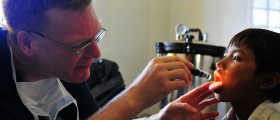
What is strep throat?
Strep throat is an infectious disease caused by streptococcal bacteria. The symptoms may be mild, moderately severe or severe, and they usually include fever, fatigue, pain, redness, and swelling of the throat and tonsils.
Strep throat usually affects school-age children and teenagers, but it also occurs fairly commonly in adults. Bacteria are spread through contact, especially by touching objects contaminated by bacteria that land on them after someone sneezed or coughed. Direct contact with infected persons is also the usual way of contamination.
It is important to distinguish sore throat caused by viral infections, and sore throat due to streptococcus. Viruses do not respond to antibiotics and the infection passes by itself after several days. Symptoms of viral infections also include runny nose, red or watery eyes, hoarse voice and diarrhea.
Treatment for strep throat
In case someone suspects he or she has strep throat, it is highly recommended to see a doctor, who will perform a physical examination and possibly do tests with swabs to determine whether the bacteria are present in the throat. When the results come in from the lab, the doctor will decide on the course of treatment.
The treatment for patients who tested positive to streptococcus usually consists of antibiotic medications like penicillin, which is usually supposed to be taken for ten days. For people who have an allergy to penicillin, the usual alternative is erythromycin.
It is very important to follow the doctor’s instructions regarding the use of antibiotics. They need to be taken several times a day, at stipulated times, and it is important not to miss a dose. A missed dose should never be substituted by taking a double dose of the medicine. The treatment should last for as long as the doctor have said, even though the symptoms may subside soon, after a few days. Discontinuing the use of antibiotics before time may lead to resistance of the bacteria to them and other complications.
Other treatment may be prescribed along with the antibiotics, and it usually includes over-the-counter pain medication, Throat lozenges and similar.
It is highly recommended to have a follow-up at the doctors when the symptoms subside.
A person who has or have recently had strep throat must take care not to infect those around them. This means keeping utensils and personal items separated, washing hands regularly, covering the mouth and the nose while sneezing, coughing, even while laughing.

















Your thoughts on this
Loading...